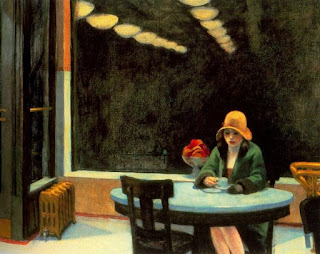Not especially surprised when I arrived at the poem Her Life is an Edward Hopper Painting, being in one myself from the beginning of Tobi Alfier's latest collection, Grit and Grace.
From the git-go: “All that is left sometimes, is to hold faith in tradition and comfort—dog laying in front of the fire, a bit of spirit to make the kisses sweet, one last song hanging in the air.” Actually that’s the last stanza of the first poem, Before any Words are Spoken, but even at the first I’d succumbed to the mood of inevitability with its respites of blessed solitude. I was one of the nighthawks in Hopper’s diner, sharing space with a stranger or two lost in private thoughts as was I, ingesting Alfier’s knowing sensibility along with my coffee and wedge of lemon pie.
Alfier
knows Hopper’s people. They live at the edge of survival, with
little chance of ever realizing their dreams, and knowing it, but
plugging along anyway, held together with determination if only just
to
keep on going. The unnamed gent who
walks in the cemetery, following
his doctor’s orders to do
ten-thousand
steps a day. “All that is left is his faith in ten-thousand, the
footfalls of loping deer, headstones in icy winter, and the last song
hanging in empty air, his bold baritone in the chorus.”
Or the three long-retired, unnamed barflies who habituate Harold’s Place: “These guys wear the stamp of fisheries, the prison, or the old scrap yard—stories told by scars, tattoos, language, and the speed at which they polish off their pension’s allotment of booze...They’ll die here, tilting barstools hug their asses barely shy of Heaven.” If they feel sorry for the way things worked out, they keep it to themselves, abiding Aristotle’s sentiment Alfier quotes: “The ideal man bears the accidents of life with dignity and grace, making the best of circumstances.”
Would that the patriarchal sage have known The Blind Woman [who] Touches her Toes in the Sea. “Gentle and chilly foam tickles her toes but does not scare her. The heart can only do this work alone, she thinks, as she often does, thankful that no one comes to ‘help’ her walk back to the street.” Dignity and grace—and love (for that you must read the poem).
Although “church” is no slur among Alfier’s people, the biblical “grace” would seem to be missing for many of them, but the occasional angel does appear. Most memorably for me is “Viv” the motherly diner waitress in Decaf or Regular who can tell when it’s time to cut off your caffeine. “She’ll know if you stayed up all night to study, fueled by No Doz and Red Bull—she knows the only way you’re gonna get out of this truck-stop town is to do well, or you’ll be takin’ the lunch rush over for Manuel. Not good.” She’s the girl in the Edward Hopper painting:
Lord God Almighty but she could put a hurt on a man—
hair up and wrapped in a smooth chignon that the glow
from a thousand fireflies of motel blinds makes shine
red as the sun in summer. A tight boiled-wool
skirt halfway up to hail Mary full of grace, shoes
to bring her eye to eye with the deep lines
in your weathered face.
She is the nightwind, the motel clerk, the diner waitress
rolled into the fantasy you’ve had since forever.
She’s the bartender and barmaid—
sometimes your desire. At others your regret.
In truth, this is your story. You are the one with shoulders
tight as the traffic that winds through the city,
not her.
She’s a bit dusty, like a wedding dress never worn,
packed away in a chest in the closet. Her cheeks the deep
rose of a hot desert wind. Her lips pursed—
with disdain or delight—it’s impossible to tell.
She’s the wildflower no one can name, windchimes
caught in a forgotten tune. A time-stamped photograph
of empty, she sits with her coffee, silent and alone.
Here’s a stanza from Aftertraces that perfectly captures the way I feel this morning, this spring, if you will, this Edward Hopper aperitif:
Hard winter days are changing into spring.
The odd dust devil kicks its heels up
the unpaved road outside her patio, masks the colors
of early wildflowers we can never praise enough
as they start to peek through mudded earth
in the fields beyond...
Tobi Alfier is a multiple Pushcart nominated poet and Best of the Net nominated poet whose poems have appeared in many publications. She is also the co-editor of the San Pedro River Review. You may contact her at sprreview@gmail.com.






